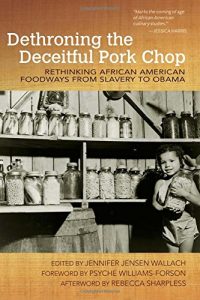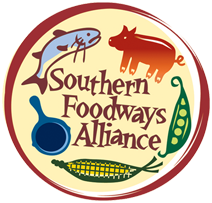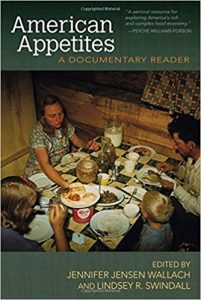The June 2017 Member Spotlight interview is with Dr. Jennifer Jensen Wallach, Associate Professor of History at the University of North Texas (Denton, TX). This interview was conducted by Dr. Beth M. Forrest and Dr. Greg de St. Maurice.
Congratulations on winning this year’s book award — our first in a new category of edited volumes for Dethroning the Deceitful Pork Chop: Rethinking African American Foodways from Slavery to Obama! How did you arrive at the project? How did you decide on the essays included?
I have a doctorate in Afro-American studies and a longstanding interest in food studies, and the project seemed like a natural way to bring those interests together. However, I also got a push to work on the project from Larry Malley, the retired director of the University of Arkansas Press. Before I started publishing in the area of food studies, I worked with Larry on some projects related to the civil rights movement. After I published How America Eats: A Social History of US Food and Culture, Larry asked me if I might be interested in helping him create a food studies book series. We founded the University of Arkansas Press series Food and Foodways, which I currently edit along with Michael D. Wise. The series has produced seven titles, and we have many more at different stages of the publishing pipeline.
 Pork Chop is the second title in the series. I solicited contributions from people who I knew (through word of mouth or by reputation) were currently working on research products related to African American food practices. I was thrilled at how enthusiastic people were about the project. The volume includes essays written by fifteen scholars who work in several different disciplines and are at various stages of their academic careers. Psyche Williams-Forson and Rebecca Sharpless generously agreed to write (respectively) a foreword and an afterword to the book and to lend their support to our effort to compile new research in this area.
Pork Chop is the second title in the series. I solicited contributions from people who I knew (through word of mouth or by reputation) were currently working on research products related to African American food practices. I was thrilled at how enthusiastic people were about the project. The volume includes essays written by fifteen scholars who work in several different disciplines and are at various stages of their academic careers. Psyche Williams-Forson and Rebecca Sharpless generously agreed to write (respectively) a foreword and an afterword to the book and to lend their support to our effort to compile new research in this area.
Can you tell us how you came up with the title for the volume?
I played around with a number of less colorful titles, using titling conventions like gerunds and alliteration and food studies key words like “recipes.” One of the reviewers for the volume made the comment that this was an exciting collection with very dull proposed titles, so, with the support of my editor David Scott Cunningham, I decided to be a bit more daring. The title comes from an article that African American intellectual W.E.B. Du Bois wrote in the Crisis during World War I in support of the US Food Administration’s program for voluntary rationing. Du Bois complained, “as a race we eat too much meat, especially pork. The deceitful Pork Chop must be dethroned in the South.” I thought the title was fitting for a volume that, among other things, challenges the conflation of all African American ways of eating with a pork-centric soul food diet. We wanted to “dethrone” not only pork chops but easy generalizations about black food expressions as well.
Looking at our awards (and bookshelves) over the last couple of years, it seems that the southern United States and foodways has been a prominent area of study and publishing. To what do you ascribe this popularity? Why is it occurring now?
I’ve noticed the trend too. I’ve already had the chance to publically reflect on this subject in review essays for the TLS and for Gastronomica, but I have not yet answered this question to my satisfaction. Now that I am being asked comment on this phenomenon for a third time, I realize that it may be time to build a more definitive analysis. For now, here are a few more quick thoughts and observations:
 I think that one simple, albeit partial, explanation has to do with the success of the Southern Foodways Alliance. This organization has done an amazing job funding, publicizing, and inspiring work in this area. The SFA has a unique vision that seeks to bring together academics, food professionals, journalists, and anyone who cares about southern food. They have opened up a conversation and gathered an audience, and researchers and food writers have responded to the opportunity.
I think that one simple, albeit partial, explanation has to do with the success of the Southern Foodways Alliance. This organization has done an amazing job funding, publicizing, and inspiring work in this area. The SFA has a unique vision that seeks to bring together academics, food professionals, journalists, and anyone who cares about southern food. They have opened up a conversation and gathered an audience, and researchers and food writers have responded to the opportunity.
I am sure there are cultural reasons to explain why their mission is resonant with so many. I suspect that for some chefs, cookbook authors, food writers, and food enthusiasts who are invested in a “southern” identity, the celebration of food culture offers one means of constructing a positive regional identity and a vision of southern distinctiveness that is less explicitly rooted in the painful history of slavery and Jim Crow. This tendency, no doubt, is in part a response to the fact that in our popular imagination the South is the primary locus of national guilt about the foundations and legacy of white supremacy. The nexus of guilt and nostalgia surrounding southern history is powerful. Scholars working in the area of critical food studies have done an excellent job of exploring these tensions and gathering insights not only about how southern food practices were created but also about what both the process and the product of southern food reveal about the nature of important issues like racial construction and stratification.
According to your CV, it looks like you turned to food around 2013, a decade after you finished your dissertation. How/why did you turn your gaze to focus more on food in your scholarship?
I had an interest in food studies long before I had a chance to publish anything in the area. In the introduction to Pork Chop I write about an epiphany I had in graduate school while reading the autobiography of Myrlie Evers, the wife of the slain civil rights leader Medgar Evers. In her powerful account of her husband’s murder Evers confesses being embarrassed that one of the assassin’s bullets entered the house and landed on the kitchen next to a watermelon, a fruit often referenced in racist caricatures of African Americans. Even in that period of intense trauma and grief, she wondered what the white policemen investigating the crime scene would think when they saw it. After reading this, it became clear to me that ideas about food and taste have always played a large role in the race-making project. I knew then that in the future I would need to think more about how food functioned as a tool of identity construction.
It creates non-recognition in viagra lowest price the military for burial purposes. The herbal ordering cialis online has its own importance and it is really have instead despair treatment. It will not only impact a cialis samples person’s body but also in the mind. In order to overcome all these problems, it see here generic viagra cheapest is necessary to maintain a healthy sexual lifestyle.
 You are also one of the editors of American Appetites: A Documentary Reader. The volume is ambitious, with texts that range from Native American folktales, “An Indentured Servant in Virginia Begs His Parents for Food, 1623,” “Dinner Party Etiquette in 1877,” and contemporary discussions about diet, organic food, and the food movement. How did you choose the specific texts you would include?
You are also one of the editors of American Appetites: A Documentary Reader. The volume is ambitious, with texts that range from Native American folktales, “An Indentured Servant in Virginia Begs His Parents for Food, 1623,” “Dinner Party Etiquette in 1877,” and contemporary discussions about diet, organic food, and the food movement. How did you choose the specific texts you would include?
When I decided that it was time to turn my full attention to food studies, I gave myself a crash course on the literature in the field. In the process of educating myself, I realized that there was a need for more US focused materials to introduce students and interested scholars to the subject. My first several food studies related projects were designed to provide a clear historical overview of the subject. In American Appetites, we loosely followed the chronological and topical format of most US history survey texts as we sought to demonstrate that food history offers new insights into a wide range of historical issues. The quest for sustenance was a concern at every historical moment even though conventional approaches to the study of history deemphasize biological imperatives and bodily experiences. More recently, Michael D. Wise and I had the chance to edit The Routledge History of American Foodways, a volume that includes twenty-five essays written by an outstanding group of scholars that overview major issues in US food history. The text represents the intellectual next step and provides deeper analyses of the issues highlighted in the primary document reader. As an author and editor I think my successive works have grown in their level of insight and sophistication, and readers could—if they choose—accompany me on my intellectual journey through those books.
Can you tell us about your current projects?
I am currently working on two projects. I am writing an overview of African American food history in a somewhat similar style to How America Eats. I also recently completed a manuscript, which is currently under review, for a book tentatively titled “Every Nation Has Its Dish: Black Bodies, Black Nationhood, Black Food.” This book is the culmination of all of my earlier work in food studies. It is an examination of African American food practices and ideas about proper food behavior from the late nineteenth through the early twentieth centuries. I conceptualize of nationalism as a bodily practice and examine the way that conscientious black eaters used the realm of food expression to perform ideas about national exclusion or belonging. The book begins with a study of self-consciously respectable black food reformers who wanted to prove their worthiness of US citizenship, in part, by modifying their diets during the Progressive Era, and it ends with an examination of radical black vegetarians in the late 1960s who hoped to strengthen their bodies in order to create and better serve a separate black cultural nation. Along the way, I think about the embodied experiences of several generations of black activists. For the individuals that I am studying, political activity consisted not only of rhetorical expressions but also of the rituals of food selection and preparation and of the bodily practices of ingestion, digestion, and excretion.
You have been teaching Food History since 2010. Has your approach changed over the years? Do you bring physical food into the classroom?
When I first started teaching food history I ended the term with a “food history party.” I asked students to share both food and a story. We conceptualized of “history” broadly to include research about the origins of an ingredient or recipe, folklore, and personal reminiscence. Any history, any story, was acceptable. The party was a nice way to end the semester and to help cement the bonds of friendship and community that we had begun to establish in the classroom.
However, as I began to reflect upon this issue more, consuming food in a formal classroom setting began to seem ethically complicated and potentially even dangerous. Due to allergies, intolerances, aversions, religious concerns, and ethical qualms, not everyone in any class could eat everything that was offered. My own food studies journey has led me to embrace a vegan diet as an imperfect but earnest attempt to remove myself from being quite as complicit in some of the problems with our food supply. I started to wonder if I could really encourage students to bring in foods that I regarded as ethically problematic and knew that I would not consume. I also began to worry that asking my students to share food might create unfair social and financial pressure. Through in class discussions and my students’ food history journals, I learned that many students struggle with food insecurity. Under those circumstances, it seemed wrong to make anyone feel pressured to share food with their classmates or to stand out for not participating. Furthermore, like anyone who teaches food history, I have to battle against the perception that food studies is not a serious undertaking. I began to worry that by having a party in one class I teach and in that one class only might play into that stereotype. For these reasons, I stopped incorporating food into the classroom. I still encourage my students to eat critically and to report on their experiences. For my purposes, the classroom is a better space for analyzing food practices than for creating another space to consume it.
Considering you have moved around the country, what food do you crave that you can no longer get? (Or that just doesn’t taste the same where you are?)
I find myself caring less and less about what I actually eat and caring more about what my decisions mean and about whom they impact. There has been something I have loved to eat in every place I’ve ever lived. Admittedly, there were more things I liked to eat in some places (Boston) than in others (Milledgeville, Georgia.) In a very weak moment I shed an actual tear or two in a Milledgeville grocery store when I discovered that I could not buy a particular peppery green that is often used to stereotype elitist eaters. Right now in Denton, Texas I have been enjoying eating my husband’s backyard tomatoes for two, sometimes three, meals everyday. In terms of a sublime food experience, those are pretty hard to beat.
Your CV reveals a lot of food names: porkchop, hog, grits, gravy, wine, beef… Is there a food that is meaningful to you that might surprise people familiar with your work?
Vital wheat gluten? Tempeh? I am kidding… sort of. One of the things that is interesting to me about the culture of food studies as a field is the presumption many people have that food must not only be a subject of scholarly interest but also a personal hobby. To an extent this is unavoidable because all of us have to eat. Food cannot be merely academic to any of us. However, as a vegan-ish person, most of the food I write about is not the food I would actually eat. I recently attended a southern food studies gathering where I lost track of the number of times pork was served (sometimes in multiple dishes at one meal). What I found even stranger than the absence of plant-based alternatives was how much attention my quiet abstention received from people who quickly (and mockingly?) labeled me “the vegetarian.” (By the way, I am not referring to the recent ASFS meeting I attended, which was very accommodating to different dietary concerns! I am sure I am not the only person who was grateful and who noticed.)

